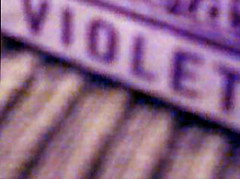The Gendercator. Catherine Crouch. Outfest. 7/21/07.
I attended a screening of the short film, The Gendercator here in LA this weekend. The film caused quite a lot of controversy within the LGBT community and was pulled from the Frameline film festival in San Francisco after transpeople and their allies protested it as a hateful and transphobic piece. Outfest, instead of pulling the piece entirely, removed it from the catalog and rescheduled it to a screening followed by a panel discussion. First and foremost, I believe that censorship is never the right solution and that Outfest handled the situation rather well by facilitating discussion about the piece. I didn't necessarily feel the discussion itself reached any major breakthroughs of understanding, but I'm glad it happened nonetheless.
The real controversy surrounding the piece is the director's statement:
Director’s Note - Things are getting very strange for women these days. More and more often we see young heterosexual women carving their bodies into porno Barbie dolls and lesbian women altering themselves into transmen. Our distorted cultural norms are making women feel compelled to use medical advances to change themselves, instead of working to change the world. This is one story, showing one possible scary future. I am hopeful that this movie will foster discussion about female body modification and medical ethics.
While this statement is offensive, it's also misleading about the film. Nowhere in the film does anyone seem to be pressured to present themselves as more feminine. The film doesn't really attack gender norms or medical ethics. I encourage you to read Crouch's explanation and defense of the statement on her website, which doesn't necessarily get less offensive.
The film itself is slightly less offensive than the director's statement, if viewed charitably. It is the story of Sally, a 1970s lesbian feminist (but a kind of dumb one) who wakes up in 2048. The future Crouch depicts involves mandatory heterosexuality and gender normativity. Because Sally is vaguely butch, she is referred to "The Gendercator" to be evaluated and recommended for sex reassignment. The Gendercator is a trans man (though I believe all of the trans male characters in the film are played by people who were born male, I could be wrong about this) and tries to convince Sally that she would be happier as a guy. When she doesn't consent to surgery, it is performed against her will.
The problems in the film itself arise because, though the director claims it is a film about Sally and the pressures she feels to be gender normative, Sally herself isn't a particularly compelling character. She says very little throughout the film, seems drugged most of the time, and the most articulate statement she can make about her gender identity is "I just want to do my own thing." As a result, The Gendercator and the world Crouch creates are much more interesting than Sally.
I just want to say here that Crouch seems to think she's made a film in which a butch woman just wants to be butch, not trans. There's nothing wrong with that. I like butch women (a lot). I'm very happy about the existance butch women and don't think anyone should transition unless it's something they're absolutely sure is right for them. I will gladly go see films about butch women who consider but decided not to transition. I will see films that compassionately articulate issues surrounding butch women feeling pressure to be trans. But lesbians and/or butch women don't have to be threatened by trans men, and a film that has to make trans men the enemy doesn't really achieve any sort of actual understanding of gender issues. The problem with the film is not that Sally is not trans and doesn't want to be trans, it's the fact that trans men are in the film portrayed as the enemy and wrong. Transition is portrayed as this horrible thing forced on lesbians by the medical establishment, religious conservatives, and transmen. This is, clearly, an ignorant position. It is possible for butch lesbians to exist without making transmen the enemy, and this film fails to understand that. As a result, it comes across as closer to hate speech against transmen than an articulate portrayal of not being trans.
So, mostly, I'm disappointed by this film. It fails to actually provoke discussion about the real tensions and concerns about being masculine and female and instead repeats an old and uninformed argument allying transgendered people with the religious right and patriarchy, asserting that they are oppressing or betraying lesbians who just want to be butch. I think that there are good things to be said about not being trans, but this film doesn't say them. I also think that there's an interesting undercurrent in this film about the heritage of 1970s lesbian feminism and contemporary issues, and it would be nice to see more dialogue between lesbians who came of age as separatists in the 1970s and younger trans and genderqueer folks. I can't help but wonder what would happen if this film were redone with Crouch working in conjunction with a trans filmmaker to articulate the issues in a way that actually raises intelligent conversation between butch women and trans men. This, sadly, was not it.
As for the discussion, Outfest didn't promote the screening very much, so the audience was mostly trans activists and allies who were upset by the film and the director's statements. They mostly wanted the director to understand why and how they found the film hateful and transphobic, and she didn't seem to be able to hear and understand that. She, understandably, seemed to be very defensive. The audience just wanted to be heard, and as a result, not a lot of real discussion occurred. The panel didn't really get a chance to frame the discussion in the way I would have liked to have seen.

1 comments:
Great insight, thank you!
Post a Comment